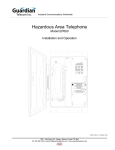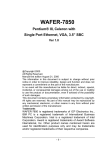Download EP600VEA Series User Manual Version A2 July 2007
Transcript
EP600 Series VIA All-in-One EPIC Board with DualView display User’s Manual Disclaimers The information in this manual has been carefully checked and is believed to be accurate. Axiomtek Co., Ltd. assumes no responsibility for any infringements of patents or other rights of third parties which may result from its use. Axiomtek assumes no responsibility for any inaccuracies that may be contained in this document. Axiomtek makes no commitment to update or to keep current the information contained in this manual. Axiomtek reserves the right to make improvements to this document and/or product at any time and without notice. No part of this document may be reproduced, stored in a retrieval system, or transmitted, in any form or by any means, electronic, mechanical, photocopying, recording, or otherwise, without the prior written permission of Axiomtek Co., Ltd. CAUTION Danger of explosion if battery is incorrectly replaced.Replace only with the same or equivalent type To be recommended by the manufacturer. Dispose of used batteries according To the manufacturer’s instructions ©Copyright 2007 by Axiomtek Co., Ltd. All rights reserved. August 2007, Version A2 Printed in Taiwan ii ESD Precautions Integrated circuits on computer boards are sensitive to static electricity. To avoid damaging chips from electrostatic discharge, observe the following precautions: Do not remove boards or integrated circuits from their anti-static packaging until you are ready to install them. Before handling a board or integrated circuit, touch an unpainted portion of the system unit chassis for a few seconds. This helps to discharge any static electricity on your body. Wear a wrist-grounding strap, available from most electronic component stores, when handling boards and components. Trademarks Acknowledgments AXIOMTEK is a trademark of AXIOMTEK Co., Ltd. MS-DOS and Windows ’95 are trademarks of Microsoft Corporation. AWARD is a trademark of Award Software. Inc. IBM, PC/AT, PS/2, VGA are trademarks of International Business Machines Corporation. Intel and Pentium are trademarks of Intel Corporation. Winbond is a trademark of Winbond Electronics Corp. SMI is a trademark of Silicon Motion Inc. Other brand names and trademarks are the properties and registered brands of their respective owners. iii This page does not contain any information. iv Table of Contents Disclaimers............................................................................ii ESD Precautions..................................................................iii C h a p t e r 1..............................................................................1 Introduction ...............................................................................1 1.1 1.2 Specifications .......................................................2 Utilities Supported................................................4 C h a p t e r 2..............................................................................5 Jumpers and Connectors .........................................................5 2.1 2.2 2.3 Board Dimensions ................................................5 Placement..............................................................7 Jumper Settings....................................................9 2.1.1 CMOS Clear Jumper: JP1 .............................................10 2.1.2 LVDS1 Voltage Selection: JP2.......................................10 2.1.3 LVDS2 Voltage Selection: JP3.......................................10 2.1.4 Compact Flash Voltage Selection: JP4 .......................10 2.1.5 COM1.COM2.COM3.COM4 Mode: JP5.JP6.JP7.JP8 ..10 2.1.6 Power Supply Selection: JP9 ........................................11 2.1.7 COM2 Mode: CN23.......................................................12 2.1.8 COM2 Mode: CN24.......................................................12 2.1.9 COM2 Mode: CN22.......................................................12 2.1.10 Audio Output Selection: CN9 .....................................12 2.4 Connectors..........................................................13 2.4.1 LVDS Backlight Connector: CN1.CN4..........................14 2.4.2 LVDS Flat Panel Connector: CN2.CN3 .........................14 2.4.3 USB Connector: CN5.................................................15 2.4.4 USB Connector: CN6.................................................16 2.4.5 VGA Connector: CN7 ...................................................16 2.4.6 Audio Connector: CN8 .................................................17 2.4.7 Ethernet Connector: CN10.CN11..............................17 Table of Contents v 2.4.8 IDE Interface Connector: CN12 ................................18 2.4.9 SATA Connector: CN13.................................................18 2.4.10 Compact Flash Connector: CN14 .............................19 2.4.11 Parallel Port Interface: CN16 ..................................20 2.4.12 Floppy Disk Controller: CN17.................................21 2.4.13 IrDA Connector: CN18 ................................................21 2.4.14 CPU Fan Connector: CN19 .....................................22 2.4.15 Serial Port Interface: CN20 (COM1).CN21 (COM2). CN28(COM3).CN29(COM4).................................................22 2.4.16 Flat Panel Bezel Connector: CN25.............................24 2.4.17 Power Button: CN26 ....................................................24 2.4.18 Keyboard and PS/2 Mouse Connectors: CN27 .....25 2.4.19 PC/104 Bus: CN30........................................................25 2.4.20 PC/104 Bus: CN31........................................................26 2.4.21 PCI104 Connector: CN32 ........................................26 2.4.22 DIO Connector: CN33 .................................................27 2.4.23 Power Connector: CN34.............................................27 C h a p t e r 3............................................................................29 Hardware Description............................................................29 3.1 3.2 3.3 3.4 3.5 Microprocessors.................................................29 BIOS .....................................................................29 System Memory ..................................................29 I/O Port Address Map .........................................30 Interrupt Controller.............................................31 C h a p t e r 4............................................................................33 Award BIOS Utility................................................................33 4.1 4.2 4.3 4.4 4.5 4.6 vi Entering Setup ....................................................33 Control Keys .......................................................34 Getting Help ........................................................34 The Main Menu....................................................35 Standard CMOS Setup Menu .............................36 Advanced BIOS Features...................................39 Table of Contents 4.7 4.8 4.9 4.10 4.11 4.12 4.13 4.14 4.15 4.16 4.17 Advanced Chipset Features ..............................44 Integrated Peripherals........................................46 Power Management Setup .................................51 PnP/PCI Configuration Setup ............................56 PC Health Status.................................................59 Frequency/Voltage Control................................60 Load Fail-Safe Defaults ......................................61 Load Optimized Defaults....................................62 Set Supervisor/User Password .........................63 Save & Exit Setup ...............................................64 Exit Without Saving ............................................65 A p p e n d i x A ......................................................................67 Watch Dog Timer....................................................................67 Watchdog Timer Setting ....................................................67 Using the Watchdog Function...........................................68 Table of Contens vii EP600 VIA Luke-LiteEPIC Board User’s Manual Chapter 1 Introduction The EP600 is a VIA Luke-Lite CPU equipped EPIC board with graphics, Dual Fast Ethernet and audio interface. Designed with the space-limited applications in mind.To simplify system integration, it packs provisions such as super I/Os, UXGA, LCD, Ethernet, solid state disk, all on a single board. Unique embedded features such as 4 serial ports (3 x RS-232, 1 x RS232/422/485) with +5V/12V power and that allow adoption of an extensive array of PC peripherals. The industrial-grade construction of EP600 series allows your system to endure the continuous operation in hostile environments where stability and reliability are basic requirements. System dependability of EP600 series are enhanced by its built-in watchdog timer, a special industrial feature not commonly seen on other motherboards. Introduction 1 EP600 VIA Luke-LiteEPIC Board User’s Manual 1.1 Specifications z CPU: VIA Luke-Lite z System Chipset: VIA Luke-Lite + VT8237R Plus z Bus Clock: 400MHz z BIOS: z Phoenix-Award BIOS, Y2K compliant 4Mbit Flash, DMI, Plug and Play SmartView for multiple LCD type selection, display mode option and application extension features RPL/PXE Ethernet Boot ROM “Load Optimized Default” to backup customized Setting in the BIOS flash chip to prevent from CMOS battery fail System Memory: 1*200-pin DDR-333/266 SODIMM Maximum DDR up to 2GB DDR266 z L2 Cache: z Onboard IDE: z integrated in CPU 1 parallel ATA-100 PATA-100 as PIO Mode 0-4, DMA Mode 0-2 and Ultra DMA/33/66/100 2 SATA-150 connectors Compact Flash Socket: One Compact Flash Type II Socket z Onboard Multi I/O: One floppy port 3 x RS-232 1 x RS-232/422/485 z USB Interface: 4 USB ports with fuse protection and complies with USB Spec. Rev. 2.0 z Watchdog Timer: 2 1~255 seconds; up to 255 levels Introduction EP600 VIA Luke-LiteEPIC Board User’s Manual z Graphics/Streaming: Luke-Lite intergrated Unified Memory Architecture shares system memory up to 64MB Single display mode maximum resolutions: z CRT: 1920*1440 LVDS LCD: 1600 x 1200 DualView display mode: CRT: 1920*1440 LVDS LCD: 1600 x 1200 LCD backlight control supported Ethernet: Dual Fast Ethernet Realtek 8100C PCI Bus 10/100M Base-T With pin compliant design for RTL8110S for Gigabit Wake On LAN (via ATX power supply) Equipped with RJ-45 interface z Audio: z VT1612A AC’97 codec audio Power Management: Introduction ACPI (Advanced Configuration and Power Interface) 3 EP600 VIA Luke-LiteEPIC Board User’s Manual z Form Factor: EPIC form Factor z Dimensions: 115 x 165 mm 2 NOTE: 1.2 Specifications are subject to change without notice. Utilities Supported z Chipset Driver z Ethernet Driver z VGA Drivers z Audio Drivers 4 Introduction EP600 VIA Luke-LiteEPIC Board User’s Manual Chapter 2 Jumpers and Connectors 2.1 Board Dimensions Hardware Description 5 EP600 VIA Luke-LiteEPIC Board User’s Manual Solder Side 6 Hardware Description EP600 VIA Luke-LiteEPIC Board User’s Manual 2.2 Placement Component Side Hardware Description 7 EP600 VIA Luke-LiteEPIC Board User’s Manual Solder Side 8 Hardware Description EP600 VIA Luke-LiteEPIC Board User’s Manual 2.3 Jumper Settings The EP600 Series is configured to match the needs of your application with the proper jumper settings. The table below is a summary of all the jumpers and their corresponding functions onboard the EP600 Series. The succeeding tables show the correct jumper settings for the onboard devices. Jumper Default Setting Jumper Setting JP1 Normal Operation/Clear CMOS setting Default: Normal Operation Short 1-2 JP2 LVDS Voltage Selection Default: 3.3V Short 1-2 JP3 LVDS Voltage Selection Default: 3.3V Short 1-2 JP4 Compact Flash Voltage Selection Default: 5V Short 1-2 JP5 COM1 Mode Select JP6 JP7 JP8 JP9 CN23 CN24 COM1 COM1 COM2 Mode Select COM2 COM2 COM3 Mode Select COM3 COM3 COM4 Mode Select COM4 COM4 Power Supply Selection Default: ATX power supply COM1 Mode Select Default: RS-232 COM1 Mode Select Default: RS-232 Pin Pin Pin Pin Pin Pin Pin Pin 1: 9: 1: 8: 1: 8: 1: 8: DCD RI DCD RI DCD RI DCD RI Short Short Short Short Short Short Short Short Short 7-9 8-10 7-9 8-10 7-9 8-10 7-9 8-10 2-3 Short 3-5,4-6 Short 3-5,4-6 CN22 COM1 Mode Select Default: RS-232 Short 1-2 CN9 Audio Speak Out/Line Out Selection Default: Speak Out Short 3-5,4-6 Hardware Description 9 EP600 VIA Luke-LiteEPIC Board User’s Manual 2.1.1 CMOS Clear Jumper: JP1 Options Normal Clear CMOS JP1 Settings Short 1-2 (default) Short 2-3 1 2 3 2.1.2 LVDS1 Voltage Selection: JP2 Options 3.3V 5V JP2 Settings 1 Short 1-2 (default) Short 2-3 2 3 2.1.3 LVDS2 Voltage Selection: JP3 Options 3.3V 5V JP3 Settings Short 1-2 (default) Short 2-3 1 2 3 2.1.4 Compact Flash Voltage Selection: JP4 Options 5V 3.3V JP4 Settings Short 1-2 (default) Short 2-3 1 2 3 2.1.5 COM1.COM2.COM3.COM4 Mode: 10 Hardware Description EP600 VIA Luke-LiteEPIC Board User’s Manual JP5.JP6.JP7.JP8 COM1 (CN20) JP5 COM2 (CN21) JP6 Pin 1=5V Short 1-3 Pin 1=5V Short 1-3 Pin 1=12V Short 3-5 or 5-7 Pin 1=12V Short 3-5 or 5-7 *Pin 1=DCD Short 7-9 *Pin 1=DCD Short 7-9 Pin 9=5V Short 2-4 Pin 8=5V Short 2-4 Pin 9=12V Short 4-6 or 6-8 Pin 8=12V Short 4-6 or 6-8 *Pin 9=RI Short 8-10 *Pin 8=RI Short 8-10 COM3 (CN28) JP7 COM4 (CN29) JP8 Pin 1=5V Short 1-3 Pin 1=5V Short 1-3 Pin 1=12V Short 3-5 or 5-7 Pin 1=12V Short 3-5 or 5-7 *Pin 1=DCD Short 7-9 *Pin 1=DCD Short 7-9 Pin 8=5V Short 2-4 Pin 8=5V Short 2-4 Pin 8=12V Short 4-6 or 6-8 Pin 8=12V Short 4-6 or 6-8 *Pin 8=RI Short 8-10 *Pin 8=RI Short 8-10 Default settings 9 7 5 3 1 10 8 6 4 2 2.1.6 Power Supply Selection: JP9 Options AT ATX JP9 Settings Short 1-2 (default) Short 2-3 Hardware Description 1 2 3 11 EP600 VIA Luke-LiteEPIC Board User’s Manual 2.1.7 COM1 Mode: CN23 Options RS-485 RS-232 CN23 Settings Short 1-3,2-4 Short 3-5,4-6(default) 5 3 1 6 4 2 2.1.8 COM1 Mode: CN24 Options RS-485 RS-232 CN24 Settings Short 1-3,2-4 Short 3-5,4-6(default) 5 3 1 6 4 2 2.1.9 COM1 Mode: CN22 Options RS-422 Short 1-2 (default) Short 3-4 RS-485 Short 5-6,7-8 RS-232 CN22 Settings 7 5 3 1 8 6 4 2 2.1.10 Audio Output Selection: CN9 Options Line-out Speak-out 12 CN9 Settings Short 1-3,2-4 Short 3-5,4-6(default) 1 2 3 4 5 6 Hardware Description EP600 VIA Luke-LiteEPIC Board User’s Manual 2.4 Connectors The connectors allow the CPU card to connect with other parts of the system. Some problems encountered by your system may be a result from loose or improper connections. Ensure that all connectors are in place and firmly attached. The following table lists the function of each connector on the EP600 Series. Connectors Label LVDS1 Backlight Connector CN1 LVDS1 Connector CN2 LVDS2 Connector CN3 LVDS2 Backlight Connector CN4 USB Connector(0,1) CN5 USB Connector(2,3) CN6 VGA Connector CN7 Audio Connector CN8 Lan1 Rj-45 Connector CN10 Lan2 Rj-45 Connector CN11 Primary IDE Connector CN12 SATA Connector CN13 CF Slot CN14 Printer Port Connector (LPT) CN16 F.D.D. Connector CN17 IrDA CN18 FAN Power connector CN19 COM1 CN20 COM2 CN21 Front Panel Connector CN25 Power Button CN26 Ps/2 Kb/Ms Connector CN27 COM3 CN28 COM4 CN29 Hardware Description 13 EP600 VIA Luke-LiteEPIC Board User’s Manual PC104-A CN30 PC104-B CN31 PCI104 CN32 2*5pin DIO CN33 Power Connector CN34 DDR SO-DIMM 200pin U6 2.4.1 LVDS Backlight Connector: CN1.CN4 PIN 1 2 3 4 5 6 7 Description 12V 12V 5V ENAB GND GND GND 2.4.2 LVDS Flat Panel Connector: CN2.CN3 The LVDS interface which is with 40-pin connector supports 18/24-bit single/dual channel type of LCD. Pin Deception Pin Deception 1 VCCM 2 VCCM 3 VCCM 4 VCCM 5 VCCM 6 VCCM 7 N.C. 8 N.C. 9 GND 10 GND 11 Channel B D3- 12 Channel B D0- 13 Channel B D3+ 14 Channel B D0+ 15 GND 16 GND 17 Channel B CLK- 18 Channel B D1- 19 Channel B CLK+ 20 Channel B D1+ 21 GND 22 GND 23 Channel A D0- 24 Channel B D2- 14 Hardware Description EP600 VIA Luke-LiteEPIC Board User’s Manual 25 Channel A D0+ 26 Channel B D2+ 27 GND 28 GND 29 Channel A D1- 30 Channel A D3- 31 Channel A D1+ 32 Channel A D3+ 33 GND 34 GND 35 Channel A D2- 36 Channel A CLK- 37 Channel A D2+ 38 Channel A CLK+ 39 GND 40 GND 41 N.C. 42 N.C. 43 N.C. 44 N.C. Remark: The LVDS connector on the SBC is a 40-pin connector. The matching connector is strongly recommended to use JST SHDR-40VS-B. The 7-pin inverter connector on the SBC is with Hirose connector. The matching connector is strongly recommended to use Hirose DF13-7S1.25C. 2.4.3 USB Connector: CN5 The Universal Serial Bus (USB) connector on the EP600 is for installation of peripherals supporting the USB interface. CN5 is 12-pin standard USB connector. USB0 and USB1 Pin Description Pin Description 1 VCC 2 VCC 3 D0- 4 D1- 5 D0+ 6 D1+ 7 Ground (GND) 8 Ground (GND) 9 Ground (GND) 10 Ground (GND) 11 Ground (GND) 12 Ground (GND) Hardware Description 15 EP600 VIA Luke-LiteEPIC Board User’s Manual 2.4.4 USB Connector: CN6 The Universal Serial Bus (USB) connector on the EP600 is for installation of peripherals supporting the USB interface. CN6 is 10-pin standard USB connector. USB2 and USB3 Pin Description Pin Description 1 2 1 VCC 2 VCC 3 4 3 D2- 4 D3- 5 6 5 D2+ 6 D3+ 7 Ground (GND) 8 Ground (GND) 7 9 8 10 9 Ground (GND) 10 Ground (GND) 2.4.5 VGA Connector: CN7 CN7 is a standard 15-pin pin DB15 connector commonly used for the CRT VGA display. Pin Description Pin Description Pin Description 1 Red 2 Green 3 Blue 4 N/A 5 GND 6 AGND 7 AGND 8 AGND 9 N/A 10 GND 11 N/A 12 DDC DAT 13 Horizontal Sync 14 Vertical Sync 15 DDC CLK 16 Hardware Description EP600 VIA Luke-LiteEPIC Board User’s Manual 2.4.6 Audio Connector: CN8 The EP600 supports audio interface.CN8 is a 10pin-header connector commonly used for the audio. Pin Signal Pin 1 MIC-IN Line In L Line In R Audio Out L Audio Out R 2 3 5 7 9 4 6 8 10 Signal GND GND GND GND GND 1 2 3 4 5 6 7 9 8 10 2.4.7 Ethernet Connector: CN10.CN11 The RJ-45 connector is used for Ethernet. To connect the EP600 to 10-Base-T or 100-Base-T hub, just plug one end of the cable into the LAN1, LAN2 and connect the other end (phone jack) of the cable to a 10-Base-T hub or 100-Base-T hub. Pin 1 2 3 4 5 6 7 8 A B Signal Tx+ (Data transmission positive) Tx- (Data transmission negative) Rx+(Data reception positive) RJ-1(For 100 base T-Only) RJ-1(For 100 base T-Only) Rx- (Data reception negative) RJ-1(For 100 base T-Only) RJ-1(For 100 base T-Only) Active LED 100 LAN LED Hardware Description 17 EP600 VIA Luke-LiteEPIC Board User’s Manual 2.4.8 IDE Interface Connector: CN12 The EP600 is built in 1 channel to support 2 IDE drives. IDE1 (44PIN): IDE1 Connector Pin Assignment Pin Description Pin Description Pin Description 1 Reset # 2 GND 3 Data 7 4 Data 8 5 Data 6 6 Data 9 7 Data 5 8 Data 10 9 Data 4 10 Data 11 11 Data 3 12 Data 12 13 Data 2 14 Data 13 15 Data 1 16 Data 14 17 Data 0 18 Data 15 19 GND 20 N.C. 21 DREQ 22 GND 23 IOW # 24 GND 25 IOR # 26 GND 27 IORDY 28 Pull down 29 DACK# 30 GND 31 IRQ 32 N.C. 33 SA1 34 PDIAG 35 SA0 36 SA2 37 CS1 # 38 CS3 # 39 Active # 40 GND 41 VCC 42 VCC 43 GND 44 N.C. 2.4.9 SATA Connector: CN13 PIN 18 Description 1 GND 2 3 STXP STXN 4 GND 5 6 SRXN SRXP 7 GND Hardware Description EP600 VIA Luke-LiteEPIC Board User’s Manual 2.4.10 Compact Flash Connector: CN14 The EP600 is equipped with a Compact Flash disk type-II socket on the solder side and it supports the IDE interface Compact Flash disk card with DMA mode supported. The socket itself is especially designed to prevent any incorrect installation of the Compact Flash disk card. Pin 1 2 3 4 5 6 7 8 9 10 11 12 13 14 15 16 17 18 19 Description GND Data 3 Data 4 Data 5 Data 6 Data 7 CS0# Address 10 ATASEL Address 9 Address 8 Address 7 VCC Address 6 Address 5 Address 4 Address 3 Address 2 Address 1 Hardware Description Pin 26 27 28 29 30 31 32 33 34 35 36 37 38 39 40 41 42 43 44 Description CD1Data 11 Data 12 Data 13 Data 14 Data 15 CS1# VS1# IORD# IOWR# WE# INTR VCC CSEL# VS2# RESET# IORDY# DMAREQ DMAACK- 19 EP600 VIA Luke-LiteEPIC Board User’s Manual 20 21 22 23 24 25 Address 0 Data 0 Data 1 Data 2 IOCS16# CD2# 45 46 47 48 49 50 DASP# PDIAG# Data 8 Data 9 Data 10 GND 2.4.11 Parallel Port Interface: CN16 The EP600 onboard LPT is multi-mode parallel port able to support: TM IBM PC/XT, PC/AT and PS/2 compatible with bi-directional parallel port Standard mode: Enhanced mode: Enhance parallel port (EPP) compatible with EPP 1.7 and EPP 1.9 (IEEE 1284 compliant) High speed mode: Microsoft and Hewlett Packard extended capabilities port (ECP) IEEE 1284 compliant The address select of the onboard parallel port in LPT1 (378H) or disabled is done by BIOS CMOS setup. Pin 1 3 5 7 9 11 13 15 17 20 Description Strobe# Data 0 Data 1 Data 2 Data 3 Data 4 Data 5 Data 6 Data 7 Pin 2 4 6 8 10 12 14 16 18 Description Auto Form Feed# Error# Initialize# Printer Select In# GND GND GND GND GND 1 2 3 4 5 6 7 9 8 10 11 13 12 15 17 19 14 16 18 20 Hardware Description EP600 VIA Luke-LiteEPIC Board User’s Manual 19 21 23 25 Acknowledge# Busy Paper Empty# Printer Select GND GND GND No connector 20 22 24 26 2.4.12 Floppy Disk Controller: CN17 The EP600 provides a 26-pin FCC Z.I.F. type connector, CN17 for support of a single floppy drives. The floppy drive could be any one of the following types: 3.5" 720KB or 1.44MB/2.88MB. Pin 1 2 3 4 5 6 7 8 9 10 11 12 13 Description Pin +5V INDEX +5V DRIVE0 +5V DSKCHG No connector READY HDOUT MOTOR ON No connector DIR HDSEL 14 15 16 17 18 19 20 21 22 23 24 25 26 Description STEP GND WDATA GND WGATE GND TRK0 GND WPT GND RDATA GND SIDE0 2.4.13 IrDA Connector: CN18 CN18 is a 5-pin IrDA connector for wireless communication. CN18 Hardware Description +5V 1 N.C. 2 IRRX 3 GND 4 IRTX 5 21 EP600 VIA Luke-LiteEPIC Board User’s Manual 2.4.14 CPU Fan Connector: CN19 CN19 is a CPU fan connector. . All CPUs require a fan for heat dispensing. The fan connector on EP600 provides power to the fan. Pin Description 1 GND 2 +5V 1 2 2.4.15 Serial Port Interface: CN20 (COM1).CN21 (COM2). CN28(COM3).CN29(COM4) The EP600 has four onboard serial ports and have +5V/12V power on pins 1 and 8 or pin 9, depending on jumper selection. COM1 is standard DB9 connectors. COM2.COM3.COM4 are the combo connectors. The pin assignments are listed below: COM1 Description 1 Data Carrier Detect (DCD) 6 Data Set Ready (DSR) 2 Receive Data (RXD) 7 Request to Send (RTS) 3 Transmit Data (TXD) 8 Clear to Send (CTS) 4 Data Terminal Ready (DTR) 9 Ring Indicator (RI) 5 Ground (GND) 22 Hardware Description EP600 VIA Luke-LiteEPIC Board User’s Manual COM2 Description 1 Data Carrier Detect (DCD) 2 Data Set Ready (DSR) 3 Receive Data (RXD) 4 Request to Send (RTS) 5 Transmit Data (TXD) 6 Clear to Send (CTS) 7 Data Terminal Ready (DTR) 8 Ring Indicator (RI) 9 Ground (GND) 10 2 1 2 1 2 N.C. COM3 Description 1 Data Carrier Detect (DCD) 2 Data Set Ready (DSR) 3 Receive Data (RXD) 4 Request to Send (RTS) 5 Transmit Data (TXD) 6 Clear to Send (CTS) 7 Data Terminal Ready (DTR) 8 Ring Indicator (RI) 9 Ground (GND) 10 1 N.C. COM4 Description 1 Data Carrier Detect (DCD) 2 Data Set Ready (DSR) 3 Receive Data (RXD) 4 Request to Send (RTS) 5 Transmit Data (TXD) 6 Clear to Send (CTS) 7 Data Terminal Ready (DTR) 8 Ring Indicator (RI) 9 Ground (GND) Hardware Description 23 EP600 VIA Luke-LiteEPIC Board User’s Manual 10 N.C. 2.4.16 Flat Panel Bezel Connector: CN25 Power LED This 2-pin connector, designated at Pins 1 and 3.5, connects the system power LED indicator to its respective switch on the case. Pin 1 is +, and pin 3.5, is assigned as -. The Power LED lights up when the system is powered ON. External Speaker and Internal Buzzer Connector Pin 2, 4, 6, and 8 of CN25 connect to the case-mounted speaker unit or internal buzzer. Short pin 4-6 when connecting the CPU card to an internal buzzer. When connecting an external speaker, set these jumpers to Open and install the speaker cable on pin 8 (-) and pin 2 (+). System Reset Switch Pins 9 & 11 of CN25 connect to the case-mounted reset switch and allow rebooting of your computer instead of turning OFF the power switch. This is a preferred method of rebooting in order to prolong the life of the system’s power supply. HDD Activity LED This connector extends to the hard drive activity LED on the control panel. This LED will flash when the HDD is being accessed. Pins 10 & 12 of CN25 connect to the hard disk drive and the front panel HDD LED. Pins 10 is -, and pin 12 is assigned as +. 2.4.17 Power Button: CN26 This 2-pin connector connects the ATX power button of the front panel to the EP600 CPU card - allowing user to control the power on/off state of the ATX power supply. 24 Hardware Description EP600 VIA Luke-LiteEPIC Board User’s Manual 2.4.18 Keyboard and PS/2 Mouse Connector:CN27 The EP600 CN27 is a DIN connector (AC97) for PS/2 Mouse and PS/2 keyboard connection. CN28 Description Connector 1 Keyboard Data 2 Mouse Data 3 GND 4 VCC 5 Keyboard Clock 6 Mouse Clock Keyboard Clock Mouse Clock 5 6 VCC Mouse Data 4 3 2 1 GND Keyboard Data 2.4.19 PC/104 Bus: CN30 The PC/104 is an industrial standard. It is a compact form factor with dimensions of 3.6” x 3.8” and is fully compatible with the ISA Bus. The PC/104 interface is able to adapt the off -shelf PC/104 modules, such as sound module, fax modem module and multi-I/O module…etc. Pin# 1 5 9 13 17 21 25 29 33 37 41 45 49 53 57 61 Pin Name IOCHCHK* SD6 SD4 SD2 SD0 AEN SA18 SA16 SA14 SA12 SA10 SA8 SA6 SA4 SA2 SA0 Pin# 2 6 10 14 18 22 26 30 34 38 42 46 50 54 58 62 Hardware Description Pin Name 0V +5V -5V -12V +12V SMEMW* IOW* DACK3* DACK1* REFRESH* IRQ7 IRQ5 IRQ3 TC +5V 0V Pin# Pin Name Pin# Pin Name 3 4 SD7 RESETDRV 7 8 SD5 IRQ9 11 12 DRQ2 SD3 15 16 ENDXFR* SD1 19 IOCHRDY 20 (KEY) 23 24 SMEMR* SA19 27 28 IOR * SA17 31 32 DRQ3 SA15 35 36 DRQ1 SA13 39 40 SYSCLK SA11 43 44 IRQ6 SA9 47 48 IRQ4 SA7 51 52 DACK2* SA5 55 56 SALE SA3 59 60 OSC SA1 63 64 0V 0V 25 EP600 VIA Luke-LiteEPIC Board User’s Manual 2.4.20 PC/104 Bus: CN31 Pin# Pin Name Pin# 1 5 9 13 17 21 25 29 33 37 0V IOCS16* IRQ11 IRQ15 DACK0* DACK5* DACK6* DACK7* +5V 0V 2 6 10 14 18 22 26 30 34 38 Pin Name Pin# Pin Name Pin# 3 MEMCS16* IRQ10 IRQ12 IRQ14 DRQ0 DRQ5 DRQ6 DRQ7 MASTER* 0V 4 0V LA23 LA21 LA19 LA17 MEMW* SD9 SD11 SD13 SD15 7 11 15 19 23 27 31 35 39 8 12 16 20 24 28 32 36 40 Pin Name SBHE* LA22 LA20 LA18 MEMR* SD8 SD10 SD12 SD14 (KEY) 2.4.21 PCI104 Connector: CN32 Pin# Pin Name Pin# Pin Name Pin# Pin Name Pin# Pin Name A1 N.C B1 Reserved C1 +5V D1 AD0 A2 N.C B2 AD2 C2 AD1 D2 +5V A3 AD5 B3 GND C3 AD4 D3 AD3 A4 C/BE0# B4 AD7 C4 GND D4 AD6 A5 GND B5 AD9 C5 AD8 D5 GND A6 AD11 B6 N.C C6 AD10 D6 M66EN A7 AD14 B7 AD13 C7 GND D7 AD12 A8 +3.3V B8 C/BE1# C8 AD15 D8 +3.3V A9 SERR# B9 GND C9 SB0# D9 PAR A10 GND B10 PERR# C10 +3.3V D10 SDONE A11 STOP* B11 +3.3V C11 LOCK# D11 GND A12 +3.3V B12 TRDY# C12 GND D12 DEVSEL# A13 FRAME# B13 GND C13 IRDY# D13 +3.3V A14 GND B14 AD16 C14 +3.3V D14 C/BE2# A15 AD18 B15 +3.3V C15 AD17 D15 GND A16 AD21 B16 AD20 C16 GND D16 AD19 A17 A18 +3.3V IDSEL0 B17 B18 AD23 GND C17 C18 AD22 IDSEL1 D17 D18 +3.3V IDSEL2 A19 A20 AD24 GND B19 B20 C/BE3# AD26 C19 C20 N.C. AD25 D19 D20 IDSEL3 GND A21 AD29 B21 +5V C21 AD28 D21 AD27 26 Hardware Description EP600 VIA Luke-LiteEPIC Board User’s Manual A22 A23 +5V REQ0# B22 B23 AD30 GND C22 C23 GND REQ1# D22 D23 AD31 N.C. A24 A25 GND GNT1# B24 B25 REQ2# N.C C24 C25 +5V GNT2# D24 D25 GNT0# GND A26 A27 +5V CLK2 B26 B27 CLK0 +5V C26 C27 GND CLK3 D26 D27 CLK1 GND A28 A29 GND +12V B28 B29 INTD# INTA# C28 C29 +5V INTB# D28 D29 RST# INTC# A30 -12V B30 Reserved C30 Reserved D30 GND 2.4.22 DIO Connector: CN33 Pin 1 3 5 7 9 Signal Out-0 Out-1 Out-2 Out-3 GND Pin 2 4 6 8 10 Signal In-0 In-1 In-2 In-3 GND 1 2 3 4 5 6 7 9 8 10 2.4.23 Power Connector: CN34 Pin Signal Pin Signal GND 1 PS_ON 2 3 GND N.C. 4 +12V 5 6 +SB5V 7 +5V 8 +5V 9 N.C. 10 GND Hardware Description 27 EP600 VIA Luke-LiteEPIC Board User’s Manual 28 Hardware Description EP600 VIA Luke-LiteEPIC Board User’s Manual Chapter 3 Hardware Description 3.1 Microprocessors The EP600 Series supports Intel® Celeron™ M and Pentium® M CPUs. Systems based on these CPUs can be operated under Windows 2000/XP and Linux environments. The system performance depends on the microprocessor installed onboard. Make sure all settings are correct for the installed microprocessor to prevent any damage to the CPU. 3.2 BIOS System BIOS used on the EP600 Series is Phoenix-Award Plug and Play BIOS. The EP600 Series contains a single 4Mbit Flash. 3.3 System Memory The EP600 Series industrial CPU card supports one 200-pin DDR SODIMM socket for a maximum memory of 1GB DDR SDRAMs. The memory module can come in sizes of 64MB, 128MB, 256MB, 512MB and 1GB. Hardware Description 29 EP600 Pentium® M All-in-One Capa Board User’s Manual 3.4 I/O Port Address Map The Intel® Pentium® M/Celeron™ M CPU communicates via I/O ports. It has a total of 1KB port addresses available for assignment to other devices via I/O expansion cards. Address Devices 000-01F DMA controller #1 020-03F Interrupt controller #1 040-05F Timer 060-06F Keyboard controller 070-07F Real time clock, NMI 080-09F DMA page register 0A0-0BF Interrupt controller #2 0C0-0DF DMA controller #2 0F0 Clear math coprocessor busy signal 0F1 Reset math coprocessor 0F8-0FF Math processor 1F0-1F8 Fixed disk controller 250-25F HR I/O 300-31F Prototype card 380-38F SDLC #2 3A0-3AF SDLC #1 3B0-3BF MDA video card (including LPT1) 3C0-3CF EGA card 3D0-3DF CGA card 3F0-3F7 Floppy disk controller 3F8-3FF Serial port #1 (COM1) 3E8-3EF 2F8-2FF Serial port #2 (COM2) 2E8-2EF 3F0-3FF 30 Super I/O Hardware Description EP600 VIA Luke-LiteEPIC Board User’s Manual 3.5 Interrupt Controller The EP600 Series is a 100% PC compatible control board. It consists of 16 interrupt request lines. Four out of the sixteen can either be programmable. The mapping list of the 16 interrupt request lines is shown on the following table. NMI Parity check error IRQ0 System timer output IRQ1 Keyboard IRQ2 Interrupt rerouting from IRQ8 through IRQ15 IRQ3 Serial port #2 IRQ4 Serial port #1 IRQ5 Reserved IRQ6 Floppy disk controller IRQ7 Parallel port #1 IRQ8 Real time clock IRQ9 Reserved IRQ10 IRQ11 IRQ12 PS/2 Mouse IRQ13 Math coprocessor IRQ14 Primary IDE channel IRQ15 Secondary IDE Channel Hardware Description 31 EP600 Pentium® M All-in-One Capa Board User’s Manual This page does not contain any information. 32 Hardware Description EP600 VIA Luke-LiteEPIC Board User’s Manual Chapter 4 Award BIOS Utility The Phoenix-Award BIOS has a built-in Setup program that allows users to modify the basic system configuration. This type of information is stored in a battery-backed RAM (CMOS RAM) that retains the Setup information each time the power is turned off. 4.1 Entering Setup There are two ways to enter the Setup program. You may either turn ON the computer and press <Del> immediately, or press the <Del> and/or <Ctrl>, <Alt>, and <Esc> keys simultaneously when the following message appears at the bottom of the screen during POST (Power on Self Test). TO ENTER SETUP PRESS DEL KEY If the message disappears before you respond and you still wish to enter Setup, restart the system and try again. This is possible by turning the system power to OFF then to ON, pressing the "RESET" button on the system case, or by simultaneously pressing <Ctrl>, <Alt>, and <Del> keys. If you do not press the keys at the correct time and the system does not boot, an error message will be displayed and you will be prompted with the following: PRESS <F1> TO CONTINUE, <CTRL-ALT-ESC> OR <DEL> TO ENTER SETUP Award BIOS Utility 33 EP600 Pentium® M All-in-One Capa Board User’s Manual 4.2 Control Keys Up arrow Moves cursor to the previous item Down arrow Moves cursor to the next item Left arrow Moves cursor to the item on the left hand Right arrow Move to the item in the right hand PgUp/“+” key Main Menu -- Quits and deletes changes into CMOS Status Page Setup Menu and Option Page Setup Menu -- Exits current page and returns to Main Menu Increases the numeric value or makes changes PgDn/“−“ key Decreases the numeric value or makes changes Esc key F3 key General help, only for Status Page Setup Menu and Option Page Setup Menu Change color from total 16 colors. F2 to select color forward, (Shift) F2 to select color backward Reserved F4 key Reserved F1 key (Shift) F2 key F8 key Restores the previous CMOS value from CMOS, only for Option Page Setup Menu Loads the default CMOS value from BIOS default table, only for Option Page Setup Menu Loads the Setup default, only for Option Page Setup Menu Reserved F9 key Reserved F10 key Saves all the CMOS changes, only for Main Menu F5 key F6 key F7 key 4.3 Getting Help z Main Menu The on-line description of the highlighted setup function is displayed at the bottom of the screen. z Status Page Setup Menu/Option Page Setup Menu Press <F1> to pop up a small help window that describes the appropriate keys to use and the possible selections for the highlighted item. To exit the Help Window press <F1> or <Esc>. 34 Award BIOS Utility EP600 VIA Luke-LiteEPIC Board User’s Manual 4.4 The Main Menu Once you enter the Award BIOS CMOS Setup Utility, the Main Menu will appear on the screen. The Main Menu allows you to select from ten setup functions and two exit choices. Use the arrow keys to select the setup function you intend to configure then press <Enter> to accept or enter its sub-menu. CMOS Setup Utility-Copyright © 2000-2004 Award Software ►Standard CMOS Features ►Frequency/Voltage Control ►Advanced BIOS Features Load Fail-Safe Defaults ►Advanced Chipset Features Load Optimized Defaults ►Integrated Peripherals Set Supervisor Password ►Power Management Setup Set User Password ►PnP/PCI Configurations Save & Exit Setup ►PC Health Status Exit Without Saving Esc : Quit F9: Menu in BIOS F10 : Save & Exit Setup F6 : SAVE CMOS TO BIOS Ç È Æ Å : Select Item F7: LOAD CMOS FROM BIOS Time, Date, Hard Disk Type… NOTE: If you find that your computer cannot boot after making and saving system changes with Setup, the Award BIOS, via its built-in override feature, resets your system to the CMOS default settings. We strongly recommend that you avoid making any changes to the chipset defaults. These defaults have been carefully chosen by both Award and your system manufacturer to provide the absolute maximum performance and reliability. Award BIOS Utility 35 EP600 Pentium® M All-in-One Capa Board User’s Manual 4.5 Standard CMOS Setup Menu The items in Standard CMOS Setup Menu are divided into 10 categories. Each category includes no, one or more than one setup items. Use the arrow keys to highlight the item and then use the <PgUp> or <PgDn> keys to select the value you want in each item. CMOS Setup Utility-Copyright © 2000-2004 Award Software Standard CMOS Features Thu, Jan 10 2002 2 : 31 : 24 Date (mm:dd:yy) Time (hh:mm:ss) Item Help Menu Level f f IDE Primary Master f IDE Primary Slave f IDE Secondary Master f IDE Secondary Slave Change the Day, month, Year and Century Drive A Drive B 1.44M, 3.5 in. None Video Halt On EGA/VGA All, But Keyboard ÇÈÆÅ : Move Enter: Select +/-/PU/PD: Value F10: Save ESC: Exit F1: General Help F5: Previous Values F6: Fail-Safe Defaults F7: Optimized Defaults z Date The date format is <day>, <date> <month> <year>. Press <F3> to show the calendar. day date month year z 36 The day of week, from Sun to Sat, determined by the BIOS, is read only The date, from 1 to 31 (or the maximum allowed in the month), can key in the numerical / function key The month, Jan through Dec. The year, depends on the year of BIOS Time The time format is <hour> <minute> <second> accepting either functions key or numerical key. The time is calculated based on the 24-hour military-time clock. For example, 1 p.m. is 13:00:00. Award BIOS Utility EP600 VIA Luke-LiteEPIC Board User’s Manual z Primary Master/Primary Slave/Secondary Master/Secondary Slave The categories identify the types of one channel that have been installed in the computer. There are 45 predefined types and 2 users definable types are for Enhanced IDE BIOS. Type 1 to Type 45 is predefined. Type User is user-definable. Press <PgUp>/<+> or <PgDn>/<−> to select a numbered hard disk type or type the number and press <Enter>. Note that the specifications of your drive must match with the drive table. The hard disk will not work properly if you enter improper information within this category. If your hard disk drive type does not match or is not listed, you can use Type User to define your own drive type manually. If you select Type User, related information is asked to be entered to the following items. Enter the information directly from the keyboard and press <Enter>. This information should be provided in the documentation from your hard disk vendor or the system manufacturer. If the controller of HDD interface is ESDI, select “Type 1”. If the controller of HDD interface is SCSI, select “None”. If the controller of HDD interface is CD-ROM, select “None”. number of cylinders LANDZONE HEADS SECTORS number of heads PRECOMP write precom MODE CYLS. landing zone number of sectors HDD access mode If there is no hard disk drive installed, select NONE and press <Enter>. z Drive A type/Drive B type The category identifies the types of floppy disk drive A or drive B installed in the computer. None No floppy drive installed 360K, 3.5 in 3.5 inch PC-type standard drive; 360Kb EPICcity 1.2M, 3.5 in 3.5 inch AT-type high-density drive; 1.2MB EPICcity 720K, 3.5 in 3.5 inch double-sided drive; 720Kb EPICcity 1.44M, 3.5 in 3.5 inch double-sided drive; 1.44MB EPICcity 2.88M, 3.5 in 3.5 inch double-sided drive; 2.88MB EPICcity Award BIOS Utility 37 EP600 Pentium® M All-in-One Capa Board User’s Manual z Halt On This field determines whether the system will halt if an error is detected during power up. No errors All errors All, But Keyboard 38 The system boot will halt on any error detected. (default) Whenever the BIOS detect a non-fatal error, the system will stop and you will be prompted. The system boot will not stop for a keyboard error; it will stop for all other errors. All, But Diskette The system boot will not stop for a disk error; it will stop for all other errors. All, But Disk/Key The system boot will not stop for a keyboard or disk error; it will stop for all other errors. Award BIOS Utility EP600 VIA Luke-LiteEPIC Board User’s Manual 4.6 Advanced BIOS Features This section allows you to configure and improve your system and allows you to set up some system features according to your preference. CMOS Setup Utility-Copyright © 2000-2004 Award Software Advanced BIOS Features CPU Feature Hard Disk Boot Priority Virus Warning CPU L1 & L2 Cache CPU L2 Cache Quick Power On Self Test First Boot Device Second Boot Device Third Boot Device Boot Other Device Swap Floppy Drive Boot Up Floppy Seek Boot Up NumLock Status Gate A20 Option Typematic Rate Setting Typematic Rate (Chars/Sec) Typematic Delay (Msec) Security Option APIC Mode PS/2 Mouse Function Control OS Select for DRAM >64MB Report No FDD For WIN 95 Full Screen Logo Show Small Screen Show Summary Screen Show Display board ID Press Enter Press Enter Disabled Enabled Enabled Enabled HDD-0 Floppy SCSI Enabled Disabled Enabled On Fast Disabled 6 250 Setup Enabled Enabled Non-OS2 No Disabled Disabled Enabled Disabled Item Help Menu Level f ÇÈÆÅ : Move Enter: Select +/-/PU/PD: Value F10: Save ESC: Exit F1: General Help F5: Previous Values F6: Fail-Safe Defaults F7: Optimized Defaults z Hard Disk Boot Priority This item can select boot device priority. Award BIOS Utility 39 EP600 Pentium® M All-in-One Capa Board User’s Manual z Virus Warning This option flashes on the screen. During and after the system boot up, any attempt to write to the boot sector or partition table of the hard disk drive will halt the system with the following message. You can run an anti-virus program to locate the problem. The default setting is “Disabled”. ! WARNING ! Disk boot sector is to be modified Type “Y” to accept write or “N” to abort write Award Software, Inc. Enabled Disabled NOTE: z z Activates automatically when the system boots up causing a warning message to appear when there is an attempt to access the boot sector or hard disk partition table. No warning message will appear when attempts to access the boot sector or hard disk partition table are made. This function is only available with DOS and other operating systems that do not trap INT13. CPU L1 & L2 Cache These two options speed up memory access. However, it depends on the CPU/chipset design. The default setting is “Enabled”. CPUs with no built-in internal cache will not provide the “CPU Internal Cache” item on the menu. Enabled Enable cache Disabled Disable cache Quick Power On Self Test This option speeds up Power on Self Test (POST) after you turn on the system power. If set as Enabled, BIOS will shorten or skip some check items during POST. The default setting is “Enabled”. Enabled Enable Quick POST Disabled Normal POST z 40 Award BIOS Utility EP600 VIA Luke-LiteEPIC Board User’s Manual z First/Second/Third Boot Device st nd rd These items allow the selection of the 1 , 2 , and 3 devices that the system will search for during its boot-up sequence. The wide range of selection includes Floppy, LS120, ZIP100, HDD0~3, SCSI, and CDROM. z Boot Other Device This item allows the user to enable/disable the boot device not listed on the First/Second/Third boot devices option above. The default setting is Enabled. z Swap Floppy Drive This allows you to determine whether to enable Swap Floppy Drive or not. When enabled, the BIOS swap floppy drive assignments so that Drive A becomes Drive B, and Drive B become Drive A. By default, this field is set to Disabled. z Boot Up Floppy Seek During POST, BIOS will determine the floppy disk drive type, 40 or 80 tracks, installed in the system. 360Kb type is 40 tracks while 720Kb, 1.2MB and 1.44MB are all 80 tracks. The default value is “Enabled”. BIOS searches for floppy disk drive to determine if it is 40 or 80 tracks. Note that BIOS can not tell from 720K, 1.2M or 1.44M drives type as they are all 80 tracks. BIOS will not search for the type of floppy disk drive by track number. There will be no warning message displayed if the drive installed is 360K. Enabled Disabled z Boot Up NumLock Status This option enables and disables the number lock function of the keypad. The default value is “On”. On Keypad functions confine with numbers Off Keypad functions convert to special functions (i.e., left/right arrow keys) z Award BIOS Utility 41 EP600 Pentium® M All-in-One Capa Board User’s Manual z Gate A20 Option The default value is “Fast”. Normal Fast z Typematic Rate Setting This determines the typematic rate of the keyboard. The default value is “Disabled”. Enabled Disabled z z 42 The A20 signal is controlled by keyboard controller or chipset hardware. Default: Fast. The A20 signal is controlled by Port 92 or chipset specific method. Enable typematic rate and typematic delay programming Disable typematic rate and typematic delay programming. The system BIOS will use default value of these 2 items and the default is controlled by keyboard. Typematic Rate (Chars/Sec) This option refers to the number of characters the keyboard can type per second. The default value is “6”. 6 6 characters per second 8 8 characters per second 10 10 characters per second 12 12 characters per second 15 15 characters per second 20 20 characters per second 24 24 characters per second 30 30 characters per second Typematic Delay (Msec) This option sets the display time interval from the first to the second character when holding a key. The default value is “250”. 250 250 msec 500 500 msec 750 750 msec 1000 1000 msec Award BIOS Utility EP600 VIA Luke-LiteEPIC Board User’s Manual z Security Option This item allows you to limit access to the system and Setup, or just to Setup. The default value is “Setup”. System Setup NOTE: The system will not boot and access to Setup will be denied if the incorrect password is entered at the prompt. The system will boot, but access to Setup will be denied if the correct password is not entered at the prompt. To disable security, select PASSWORD SETTING at Main Menu and then you will be asked to enter password. Do not type anything, just press <Enter> and it will disable security. Once the security is disabled, the system will boot and you can enter Setup freely. z OS Select for DRAM >64MB This segment is specifically created for OS/2 when DRAM is larger than 64MB. If your operating system is OS/2 and DRAM used is larger the 64MB, you have to select “OS 2”, otherwise (under non-OS2), default is NON-OS2. The default value is “NonOS2”. z Report No FDD For Win 95 This option allows Windows 95 to share IRQ6 (assigned to a floppy disk drive) with other peripherals in case the drive does not exist. The default setting is “No”. Award BIOS Utility 43 EP600 Pentium® M All-in-One Capa Board User’s Manual 4.7 Advanced Chipset Features Since the features in this section are related to the chipset on the CPU board and are completely optimized, you are not recommended to change the default settings in this setup table unless you are well oriented with the chipset features. CMOS Setup Utility-Copyright © 1984-2001 Award Software Advanced Chipset Features DRAM Timing CASs Latency Time Active to Recharge Delay DRAM RAS# to CAS# Delay DRAM RAS# Recharge DRAM Data Integrity Mode MGM Core Frequency System BIOS Cacheable Video BIOS Cacheable Memory Hole At 15M-16M Delayed Transaction Delay Prior to Thermal AGP Aperture Size (MB) Init Display First By SPD 2.5 7 3 3 Non-ECC Auto Max 400/333MHz Enable Disabled Disabled Disabled 16 Min 64 Onboard ** On-Chip VGA Setting ** On-Chip VGA On-Chip Frame Buffer Size Boot Display Panel Scaling Panel Number Enabled 32MB Auto Auto 640 x480 Item Help Menu Level f ÇÈÆÅ : Move Enter: Select +/-/PU/PD: Value F10: Save ESC: Exit F1: General Help F5: Previous Values F6: Fail-Safe Defaults F7: Optimized Defaults z 44 SDRAM CAS latency Time You can select CAS latency time in HCLKs 2, 3, or Auto. The board designer should set the values in this field, depending on the DRAM installed. Do not change the values in this field unless you change specifications of the installed DRAM or the installed CPU. Award BIOS Utility EP600 VIA Luke-LiteEPIC Board User’s Manual z DRAM Data Integrity Mode This option sets the data integrity mode of the DRAM installed in the system. The default setting is “Non-ECC”. z System BIOS Cacheable Selecting Enabled allows caching of the system BIOS ROM at F0000h-FFFFFh, resulting in better system performance. However, if any program writes to this memory area, a system error may result. The default value is “Disabled”. z Video BIOS Cacheable This item allows you to change the Video BIOS location from ROM to RAM. Video Shadow will increase the video speed. z Video RAM Cacheable Selecting Enabled allows caching of the video BIOS ROM at C0000h to C7FFFh, resulting in better video performance. However, if any program writes to this memory area, a system error may result. The default value is “Disabled”. z Memory Hole at 15M-16M You can reserve this area of system memory for ISA adapter ROM. When this area is reserved, it cannot be cached. The user information of peripherals that need to use this area of system memory usually discusses their memory requirements. The default value is “Disabled”. z Delayed Transaction The chipset has an embedded 32-bit posted write buffer to support delay transactions cycles. Select Enabled to support compliance with PCI specification version 2.1. The options available are Enabled and Disabled. z AGP Aperture Size (MB) The field sets aperture size of the graphics. The aperture is a portion of the PCI memory address range dedicated for graphics memory address space. Host cycles that hit the aperture range are forwarded to the AGP without any translation. The options available are 4M, 8M, 16M, 32M, 64M, 128M and 256M. Award BIOS Utility 45 EP600 Pentium® M All-in-One Capa Board User’s Manual 4.8 Integrated Peripherals This option sets your hard disk configuration, mode and port. CMOS Setup Utility-Copyright © 1984-2001 Award Software Integrated Peripherals ►On Chip IDE Device ►On Board Device ►Superior Device Onboard LAN boot ROM Press Enter Press Enter Press Enter Disable Menu Level f ÇÈÆÅ : Move Enter: Select +/-/PU/PD: Value F10: Save ESC: Exit F1: General Help F5: Previous Values F6: Fail-Safe Defaults F7: Optimized Defaults CMOS Setup Utility-Copyright © 1984-2001 Award Software On Chip IDE Device IDE DMA transfer Access On-Chip Primary PCI IDE IDE Primary Master PIO IDE Primary Master PIO IDE Primary Master UDMA IDE Primary Master UDMA On-Chip Primary PCI IDE IDE Secondary Master PIO IDE Secondary Master PIO IDE Secondary Master PIO IDE Secondary Master PIO Enabled Enabled Auto Auto Auto Auto Enabled Auto Auto Auto Auto ** On-Chip Serial ATA Setting ** SATA Mode On-Chip Serial ATA Serial ATA Port0 Serial ATA Port1 IDE Auto Primary Master Primary Master IDE HDD Block Mode Enabled Menu Level f ÇÈÆÅ : Move Enter: Select +/-/PU/PD: Value F10: Save ESC: Exit F1: General Help F5: Previous Values F6: Fail-Safe Defaults F7: Optimized Defaults 46 Award BIOS Utility EP600 VIA Luke-LiteEPIC Board User’s Manual CMOS Setup Utility-Copyright © 1984-2001 Award Software On board Device USB Controller USB 2.0 Controller USB Keyboard Support USB Mouse Support AC97 Audio Hance Rapid Watchdog Enable Enabled Disabled Disabled Auto 0 Menu Level f ÇÈÆÅ : Move Enter: Select +/-/PU/PD: Value F10: Save ESC: Exit F1: General Help F5: Previous Values F6: Fail-Safe Defaults F7: Optimized Defaults BIOS Setup Utility-Copyright © 1984-2001 Award Software Super IO Device Onboard FDC Controller Onboard Serial Port 1 Onboard Serial Port 1 UART Mode Select Red, TxD Active IR Transmission Delay UR2 Duplex Mode Use IR Pins Onboard Parallel Port Parallel Port Mode EPP Mode Select ECP Mode Use DMA ICH Serial Port 1 ICH Serial Port 1 Use IRQ ICH Serial Port 2 ICH Serial Port 2 Use IRQ PWRON after power fail Enabled 3F8/IRQ4 2F8/IRQ3 Normal Hi,Lo Enabled Half IR-Rx2Tx2 378/IRQ7 SPP EEP1.7 3 3E8 IRQ10 2E8 IRQ11 OFF Menu Level f ÇÈÆÅ : Move Enter: Select +/-/PU/PD: Value F10: Save ESC: Exit F1: General Help F5: Previous Values F6: Fail-Safe Defaults F7: Optimized Defaults z IDE Primary/Secondary Master/Slave PIO The four IDE PIO (Programmed Input/Output) fields let you set a PIO mode (0-4) for each of the four IDE devices that the onboard IDE interface supports. Modes 0 through 4 provide successively increased performance. In Auto mode, the system automatically determines the best mode for each device. The options available are Auto, Mode 0, Mode 1, Mode 2, Mode 3, and Mode 4. z IDE Primary/Secondary Master/Slave UDMA Award BIOS Utility 47 EP600 Pentium® M All-in-One Capa Board User’s Manual Ultra DMA 66/100 implementation is possible only if your IDE hard drive supports it and the operating environment includes a DMA driver (Windows 95 OSR2 or a third-party IDE bus master driver). If your hard drive and your system software support Ultra DMA 33/66/100, select Auto to enable BIOS support. The options available are Auto, Mode 0, Mode 1, and Mode 2. z On-Chip Primary/Secondary PCI IDE The integrated peripheral controller contains an IDE interface with support for two IDE channels. Select Enabled to activate each channel separately. The default value is “Enabled”. NOTE: Choosing Disabled for these options will automatically remove the IDE Primary Master/Slave PIO and/or IDE Secondary Master/Slave PIO items on the menu. z USB Keyboard Support Select Enabled if your system contains a Universal Serial Bus (USB) controller and you have a USB keyboard. z Init Display First This item allows you to decide to active whether PCI Slot or AGP first. The options available are PCI Slot, AGP. z IDE HDD Block Mode This field allows your hard disk controller to use the fast block mode to transfer data to and from your hard disk drive. 48 Award BIOS Utility EP600 VIA Luke-LiteEPIC Board User’s Manual z POWER ON Function This option allows users to select the type of power ON sequence for the system to follow. The default value is “Button-Only”. BUTTONONLY Password Hot KEY Follows the conventional way of turning OFF system power (via power button). Upon selecting this option, the KB POWER ON Password line appears. Press <Enter> and you’ll be prompted to enter and confirm a password of your choice. After setting the password, succeeding attempts to power ON the system will result to null. For system to activate, user must input the password via keyboard then press <Enter>. This option is very similar with that of Password. Hotkey combinations range from Ctrl-F1 to Ctrl-F12. User may define this combination from the Hot key Power ON option. z Onboard FDC Controller Select Enabled if your system has a floppy disk controller (FDC) installed on the system board and you wish to use it. If you install and-in FDC or the system has no floppy drive, select Disabled in this field. The options available are Enabled, Disabled. z Onboard Serial Port 1/Port 2 Select an address and corresponding interrupt for the first and second serial ports. The options available are 3F8/IRQ4, 2E8/IRQ3, 3E8/IRQ4, 2F8/IRQ3, Disabled, Auto. z UART2 Duplex Mode The second serial port offers these infrared interface modes: ¾ ¾ ¾ NOTE: IrDA ASKIR IrDA-compliant serial infrared port Normal (default value) The UART Mode Select will not appear on the menu once you disable the setting of Onboard Serial Port 2. When UART Mode Select is set as ASKIR or IrDA, the options RxD, TxD Active and IR Transmittion delay will appear. Award BIOS Utility 49 EP600 Pentium® M All-in-One Capa Board User’s Manual z Parallel Port Mode Select an operating mode for the onboard parallel (printer) port. Select Normal unless your hardware and software require one of the other modes offered in this field. The options available are EPP1.9, ECP, SPP, ECPEPP1.7, and EPP1.7. z ECP Mode Use DMA Select a DMA channel for the parallel port for use during ECP mode. 50 Award BIOS Utility EP600 VIA Luke-LiteEPIC Board User’s Manual 4.9 Power Management Setup The Power Management Setup allows you to save energy of your system effectively. It will shut down the hard disk and turn OFF video display after a period of inactivity. CMOS Setup Utility-Copyright © 1984-2001 Award Software Power Management Setup ACPI function ACPI Suspend Type Power Management PM Control by APM Video Off Method Video off After MODEM Use IRQ Suspend Mode HDD Power Down Soft-Off by PWR-BTTN CPU THRM-Throttling Wake-up by PCI card PowerOn by Ring Wake UP On LAN USB KB Wake-Up From S3 Resume by Alarm Date (of Month) Alarm Time (hh:mm:ss) Alarm Disable S1(POS) Min Saving Yes V/H SYNC+Blank Standby 3 1 Hour 15 Min Instant-Off 50.0% Enabled Enabled Enabled Disabled Disabled 0 0:0:0 Item Help Menu Level f ** Reload Global Timer Events ** Primary IDE 0 Disabled Primary IDE 1 Disabled Secondary IDE 0 Disabled Secondary IDE 1 Disabled FDD,COM,LPT Port Disabled PCI PIRQ[A-D]# Disabled ÇÈÆÅ : Move Enter: Select +/-/PU/PD: Value F10: Save ESC: Exit F1: General Help F5: Previous Values F6: Fail-Safe Defaults F7: Optimized Defaults Award BIOS Utility 51 EP600 Pentium® M All-in-One Capa Board User’s Manual z ACPI Function This item allows you to enable/disable the Advanced Configuration and Power Management (ACPI). The options available are Enabled, Disabled. z Power Management This option allows you to select the type (or degree) of power saving for Doze, Standby, and Suspend modes. The table below describes each power management mode: Max Saving Maximum power savings. Only Available for SL CPUs. Inactivity period is 1 minute in each mode. User Define Sets each mode individually. Select time-out periods in the PM Timers section, following. Min Saving Minimum power savings. Inactivity period is 1 hour in each mode (except the hard drive). Default value Disabled z PM Control by APM If Advanced Power Management (APM) is installed on your system, selecting Yes gives better power savings. The default value is “Yes”. No Yes NOTE: 52 System BIOS will ignore APM when power managing the system System BIOS will wait for APM’s prompt before it enters any PM mode (i.e., DOZE, STANDBY or SUSPEND). Note: If APM is installed or if there is a task running, even when the timer has timed out, the APM will not prompt the BIOS to put the system into any power saving mode! If APM is not installed, this option has no effect. Award BIOS Utility EP600 VIA Luke-LiteEPIC Board User’s Manual z Video Off Method Determines the manner in which the monitor is blanked. Turns OFF vertical and horizontal synchronization ports and writes blanks to the video buffer Select this option if your monitor supports the Display Power Management Signaling (DPMS) standard of the Video Electronics Standards Association (VESA). Use the software supplied for your video subsystem to select video power management values. System only writes blanks to the video buffer. V/H SYNC+Blank DPMS Blank Screen z Video Off After As the system moves from lesser to greater power-saving modes, select the mode in which you want the monitor to blank off. The default value is “Standby”. NOTE: z NA System BIOS will never turn off the screen Suspend Screen off when system is in SUSPEND mode Standby Screen off when system is in STANDBY mode Doze Screen off when system is in DOZE mode Green monitors detect the V/H SYNC signals to turn off its electron gun Modem Use IRQ 3, 4, 5, 7, 9, 10, 11, NA z For external modem, 3 or 4 will be used for card type modem. It is up to card definition. Default is 3. Doze Mode After the selected period of system inactivity (1 minute to 1 hour), the CPU clock runs at slower speed while all other devices still operate at full speed. The default value is “Disabled”. Disabled System will never enter doze mode 1/2/4/6/8/10/20/30/ 40 Min/1 Hr Defines the continuous idle time before the system entering DOZE mode. z Award BIOS Utility 53 EP600 Pentium® M All-in-One Capa Board User’s Manual z z z Standby Mode After the selected period of system inactivity (1 minute to 1 hour), the fixed disk drive and the video shut off while all other devices still operate at full speed. The default value is “Disabled”. Disabled System will never enter STANDBY mode 1/2/4/6/8/10/2 0/30/40 Min/1 Hr Defines the continuous idle time before the system entering STANDBY mode. If any item defined in (J) is enabled & active, STANDBY timer will be reloaded Suspend Mode After the selected period of system inactivity (1 minute to 1 hour), all devices except the CPU shut off. The default value is “Disabled”. Disabled System will never enter SUSPEND mode 1/2/4/6/8/10/2 0/30/40 Min/1 Hr Defines the continuous idle time before the system entering SUSPEND mode. If any item defined in (J) is enabled & active, SUSPEND timer will be reloaded HDD Power Down After the selected period of drive inactivity (1 to 15 minutes), the hard disk drive powers down while all other devices remain active. The default value is “Disabled”. Disabled HDD’s motor will not power OFF. 1/2/3/4/5/6/7/ 8/9/10/11/12/1 3/14/15 Min Defines the continuous HDD idle time before the HDD enters power saving mode (motor OFF) z Throttle Duty Cycle When the system enters Doze mode, the CPU clock runs only part of the time. You may select the percent of time that the clock runs. The default value is “62.5%”. z VGA Active Monitor When Enabled, any video activity restarts the global timer for Standby mode. The default value is “Enabled”. 54 Award BIOS Utility EP600 VIA Luke-LiteEPIC Board User’s Manual z Soft-Off by PWR-BTTN This option only works with systems using an ATX power supply. It also allows the user to define which type of soft power OFF sequence the system will follow. The default value is “InstantOff”. Instant-Off Delay 4 Sec. This option follows the conventional manner systems perform when power is turned OFF. Instant-Off is a soft power OFF sequence requiring only the switching of the power supply button to OFF Upon turning OFF system from the power switch, this option will delay the complete system power OFF sequence by approximately 4 seconds. Within this delay period, system will temporarily enter into Suspend Mode enabling you to restart the system at once. z Power On by Ring This option allows the system to resume or wake up upon detecting any ring signals coming from an installed modem. The default value is “Enabled”. z IRQ 8 Break Suspend You can turn on or off monitoring of IRQ8 (the Real Time Clock) so it does not awaken the system from Suspend mode. The default value is “Disabled”. z Reload Global Timer Events When Enabled, an event occurring on each device listed below restarts the global time for Standby mode. Award BIOS Utility 55 EP600 Pentium® M All-in-One Capa Board User’s Manual 4.10 PnP/PCI Configuration Setup This section describes configuring the PCI bus system. PCI, or Personal Computer Interconnect, is a system which allows I/O devices to operate at speeds nearing the speed the CPU itself uses when communicating with its own special components. This section covers some very technical items and it is strongly recommended that only experienced users should make any changes to the default settings. CMOS Setup Utility-Copyright © 1984-2001 Award Software PnP/PCI Configurations Reset Configuration Data Disabled Item Help Menu Level f Resources Controlled By ►IRQ Resources Auto (ESCD) Press Enter PCI/VGA Palette Snoop Disabled Select Yes if you are using a Plug and play EPICble operating system select No if you need the BIOS to configure non-boot devices ÇÈÆÅ : Move Enter: Select +/-/PU/PD: Value F10: Save ESC: Exit F1: General Help F5: Previous Values F6: Fail-Safe Defaults F7: Optimized Defaults z PNP OS Installed Select Yes if the system operating environment is Plug-and-Play aware (e.g., Windows 95). The default value is “No”. z Reset Configuration Data Normally, you leave this field Disabled. Select Enabled to reset Extended System Configuration Data (ESCD) when you exit Setup or if you have installed a new add-on and the system reconfiguration has caused such a serious conflict that the operating system can not boot. The options available are Enabled and Disabled. 56 Award BIOS Utility EP600 VIA Luke-LiteEPIC Board User’s Manual z Resources Controlled By The Award Plug and Play BIOS can automatically configure all the boot and Plug and Play-compatible devices. If you select Auto, all the interrupt request (IRQ), DMA assignment, and Used DMA fields disappear, as the BIOS automatically assigns them. The default value is “Manual”. z IRQ Resources When resources are controlled manually, assign each system interrupt as one of the following types, depending on the type of device using the interrupt: 1. Legacy ISA Devices compliant with the original PC AT bus specification, requiring a specific interrupt (such as IRQ4 for serial port 1). 2. PCI/ISA PnP Devices compliant with the Plug and Play standard, whether designed for PCI or ISA bus architecture. The default value is “PCI/ISA PnP”. z DMA Resources When resources are controlled manually, assign each system DMA channel as one of the following types, depending on the type of device using the interrupt: 1. 2. Legacy ISA Devices compliant with the original PC AT bus specification, requiring a specific DMA channel. PCI/ISA PnP Devices compliant with the Plug and Play standard, whether designed for PCI or ISA bus architecture. The default value is “PCI/ISA PnP”. z Memory Resources This sub menu can let you control the memory resource. Award BIOS Utility 57 EP600 Pentium® M All-in-One Capa Board User’s Manual z PCI/VGA Palette Snoop Some non-standard VGA display cards may not show colors properly. This field allows you to set whether MPEG ISA/VESA VGA Cards can work with PCI/VGA or not. When enabled, a PCI/VGA can work with a MPEG ISA/VESA VGA card. When disabled, a PCI/VGA cannot work with a MPEG ISA/VESA Card. z Assign IRQ For USB/VGA Enable/Disable to assign IRQ for USB/VGA. 58 Award BIOS Utility EP600 VIA Luke-LiteEPIC Board User’s Manual 4.11 PC Health Status This option configures the PCI bus system. All PCI bus systems on the system use INT#, thus all installed PCI cards must be set to this value. CMOS Setup Utility-Copyright © 1984-2001 Award Software PC Health Status CPU Warning Temperature Current GMCH Temperature Current CPU Temp. Current System Temp. Current FAN1 Speed Current FAN2 Speed Vcore VTT +3.3V +5V +12V -12V -5V VBAT (V) 5VSB (V) Shutdown Temperature Disabled Item Help Menu Level f Disabled ÇÈÆÅ : Move Enter: Select +/-/PU/PD: Value F10: Save ESC: Exit F1: General Help F5: Previous Values F6: Fail-Safe Defaults F7: Optimized Defaults z Current CPU Temperature These read-only fields reflect the functions of the hardware thermal sensor that monitors the chip blocks and system temperatures to ensure the system is stable. z Current FAN1/FAN2 Speed These optional and read-only fields show the current speeds in RPM (revolution per minute) for the CPU fan and chassis fan as monitored by the hardware monitoring IC. Award BIOS Utility 59 EP600 Pentium® M All-in-One Capa Board User’s Manual 4.12 Frequency/Voltage Control This option configures the PCI bus system. All PCI bus systems on the system use INT#, thus all installed PCI cards must be set to this value. CMOS Setup Utility-Copyright © 1984-2001 Award Software Frequency/Voltage Control Auto Detect DIMM/PCI Clk Spread Spectrum Enabled [Disabled] Item Help Menu Level f ÇÈÆÅ : Move Enter: Select +/-/PU/PD: Value F10: Save ESC: Exit F1: General Help F5: Previous Values F6: Fail-Safe Defaults F7: Optimized Defaults z Auto Detect DIMM/PCI Clk This item automatically detects the clock speeds of the system memory installed as well as the PCI interface. The options available are Enabled and Disabled. The default setting is Enabled. z Speed Spectrum This item directly relates to the EMI performance of the whole system. When enabled, all system clocks run at slower speeds thereby decreasing the electromagnetic interference to the surrounding environment. Disabling this item improves the system performance but simultaneously increase the EMI. The default setting is Disabled. 60 Award BIOS Utility EP600 VIA Luke-LiteEPIC Board User’s Manual 4.13 Load Fail-Safe Defaults This option allows you to load the troubleshooting default values permanently stored in the BIOS ROM. These default settings are non-optimal and disable all high-performance features. CMOS Setup Utility-Copyright © Award Software ` Standard CMOS Features ` Advanced BIOS Features Load Fail-Safe Defaults ` Advanced Chipset Features Load Optimized Defaults ` Integrated Peripherals Set Supervisor Password ` Power Ma ` ` ` Frequency/Voltage Control Load Fail-Safe Defaults (Y/N)? N PnP/PCI C PC Health Status Exit Without Saving Esc : Quit F10 : Save & Exit Setup Ç È Æ Å : Select Item Load Fail-Safe Defaults To load BIOS defaults value to CMOS SRAM, enter “Y”. If not, enter “N”. Award BIOS Utility 61 EP600 Pentium® M All-in-One Capa Board User’s Manual 4.14 Load Optimized Defaults This option allows you to load the default values to your system configuration. These default settings are optimal and enable all high performance features. CMOS Setup Utility-Copyright © Award Software ` Standard CMOS Features ` Advanced BIOS Features Load Fail-Safe Defaults ` Advanced Chipset Features Load Optimized Defaults ` Integrated Peripherals Set Supervisor Password ` Power Man ` PnP/PCI Co ` PC Health Status ` Frequency/Voltage Control Load Optimized Defaults (Y/N)? N Exit Without Saving Esc : Quit F10 : Save & Exit Setup Ç È Æ Å : Select Item Load Optimized Defaults To load SETUP defaults value to CMOS SRAM, enter “Y”. If not, enter “N”. 62 Award BIOS Utility EP600 VIA Luke-LiteEPIC Board User’s Manual 4.15 Set Supervisor/User Password You can set either supervisor or user password, or both of then. The differences between are: 1. 2. Supervisor password: can enter and change the options of the setup menus. User password: just can enter but do not have the right to change the options of the setup menus. When you select this function, the following message will appear at the center of the screen to assist you in creating a password. ENTER PASSWORD: Type the password with eight characters at most, and press <Enter>. The password typed will now clear any previously entered password from CMOS memory. You will be asked to confirm the password. Type the password again and press <Enter>. You may also press <Esc> to abort the selection and not enter a password. To disable password, just press <Enter> when you are prompted to enter password. A message will confirm the password being disabled. Once the password is disabled, the system will boot and you can enter Setup freely. PASSWORD DISABLED. When a password is enabled, you have to type it every time you enter Setup. This prevents any unauthorized person from changing your system configuration. Additionally when a password is enabled, you can also require the BIOS to request a password every time the system reboots. This would prevent unauthorized use of your computer. You determine when the password is required within the BIOS Features Setup Menu and its Security option. If the Security option is set to “System”, the password is required during boot up and entry into Setup. If set as “Setup”, prompting will only occur prior to entering Setup. Award BIOS Utility 63 EP600 Pentium® M All-in-One Capa Board User’s Manual 4.16 Save & Exit Setup This allows you to determine whether or not to accept the modifications. Typing “Y” quits the setup utility and saves all changes into the CMOS memory. Typing “N” brigs you back to Setup utility. CMOS Setup Utility-Copyright © Award Software ` Standard CMOS Features ` Advanced BIOS Features Load Fail-Safe Defaults ` Advanced Chipset Features Load Optimized Defaults ` Integrated Peripherals Set Supervisor Password ` Power Man ` ` ` Frequency/Voltage Control SAVE to CMOS and EXIT (Y/N)? Y PnP/PCI Con PC Health Status Exit Without Saving Esc : Quit F10 : Save & Exit Setup Ç È Æ Å : Select Item Save Data to CMOS 64 Award BIOS Utility EP600 VIA Luke-LiteEPIC Board User’s Manual 4.17 Exit Without Saving Select this option to exit the Setup utility without saving the changes you have made in this session. Typing “Y” will quit the Setup utility without saving the modifications. Typing “N” will return you to Setup utility. CMOS Setup Utility-Copyright © Award Software ` Standard CMOS Features ` Advanced BIOS Features Load Fail-Safe Defaults ` Advanced Chipset Features Load Optimized Defaults ` Integrated Peripherals Set Supervisor Password ` Power Man ` ` ` Frequency/Voltage Control Quit Without Saving (Y/N)? N PnP/PCI Con PC Health Status Exit Without Saving Esc : Quit F10 : Save & Exit Setup Ç È Æ Å : Select Item Abandon all Data’s Award BIOS Utility 65 EP600 Pentium® M All-in-One Capa Board User’s Manual This page does not contain any information. 66 Award BIOS Utility EP600 VIA Luke-LiteEPIC Board User’s Manual Appendix A Watch Dog Timer Watchdog Timer Setting The watchdog timer makes the system auto-reset while it stops to work for a period. The integrated watchdog timer can be setup as system reset mode by program. Timeout Value Range 1 to 255 Second Program Sample Watchdog timer setup as system reset with 5 second of timeout 2E, 87 2E, 87 2E, 07 2F, 00 Logical Device 0 2E, 29 Set WDT Funtion Enable 2F, A0 2E, 07 2F, 08 Logical Device 8 2E, 30 Activate 2F, 01 2E, F3 Set Second 2F, N N = 0 or 4 2E, F4 Set Value 2F, M M = 00 ~ FF Watch dog Timer 67 EP600 Pentium® M All-in-One Capa Board User’s Manual Using the Watchdog Function Start ↓ Un-Lock WDT ↓ Select Logic device O 2F 00 : O 2E 87 O 2E 87 : O 2E 07 Set WDT Funtion O 2F A0 : O 2E 29 Select Logic device : O 2E 07 O 2F 08 Set Second or Minute : O 2E F3 O 2F N table) ↓ Set base timer : O 2E F4 to 255 ↓ Activate WDT ↓ WDT counting ↓ re-set timer below table) ↓ IF No re-set timer IF to disable WDT ; Un-lock super I/O ; Un-lock super I/O N=00 or 04(See below O 2F M=00,01,02,…FF(Hex) ,Value=0 : O 2E 30 O 2F 01 : O 2E F4 O 2F M ; M=00,01,02,…FF(See : WDT time-out, generate RESET : O 2E 30 O 2F 00 ; Can be disable at any time 68 Watch dog Timer
































































































